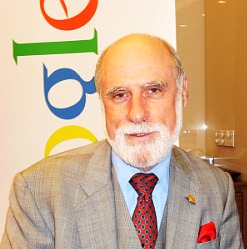A peek into the Internet in 2035

SINGAPORE--Expect the line between real and virtual to continually get blurred, said Vint Cerf.
Credited as one of the "founding fathers of the Internet" for co-designing the TCP/IP protocol of the Internet, Vinton G. Cerf is today Google's vice president and chief Internet evangelist.
Speaking at a media roundtable Friday, Cerf delivered several predictions on what life around the Internet might be like in 2035 as it evolves with the technology.
 |
1. Broadband speeds will change the way people consume media
As Internet speeds get faster, streaming media such as videos and podcasts will cease to be a common delivery method, said Cerf.
"I think this is temporary...When you get to gigabit speeds, you no longer need to deliver the video in streaming mode.
"It's really just a file transfer. It only takes 16 seconds to download an hour of video at gigabit speeds," said Cerf, adding that only about 15 percent of online video content such as live news or sports programs will eventually be streamed.
The run-on effect of having more bandwidth with which to consume data will empower users to filter out unwanted advertisements, so companies need to focus on driving ads to their specific audience, Cerf said.
"Ads that are of interest is information to the consumer, not junk mail," said Cerf.
2. Internet-enabled handhelds will act as "remote controls"
Cerf envisions increased reliance and power given to small handheld devices, especially mobile phones. He painted the example of having projectors or high-definition screens in meeting rooms, where a user could choose to display information on them easily upon stepping in.
With Internet-enabled projectors comes bigger possibilities--the user could command the projector, through his mobile phone, to extract larger amounts of data from the cloud, presenting a richer experience, said Cerf.
"You could remotely direct your PC at home to start downloading a movie before you get home, so that it's ready when you want it later. Or move information to a hotel before you get there so it's waiting for you," said Cerf.
In 2035, the world population is predicted to hit 8.12 billion, with 60 billion mobile devices between them, according to Cerf.
Pointing to Google-funded mobile platform, Android, Cerf said future mobile users will want to be able to choose the applications that go on phones, and such open source development platforms allow for greater choice and power afforded to users in making full use of their devices.
3. The imminent death of traditional print
As the green agenda grows larger and user-generated content continues to grow, news online will likely overtake--if not replace--the traditional printed press, said Cerf.
"The function of reporting will continue to be extremely valuable. We will still need people to gather information...we will still need editors.
"But the mechanics of newspaper reporting may evaporate--when a story goes up, it goes up," said Cerf, referring to the "instant publishing" phenomenon of blogs and the online press.
"People may not have the 'morning' news anymore, but a stream or box that lights up when there's a news story," Cerf elaborated.
Green concerns will also help drive down the use of paper. "My wife cancelled her subscription to the Washington Post because she can get it online, and she didn't want anymore dead trees in the house," said Cerf.
But the revenue model around the press will persist, he noted. "My wife is just as good a customer [online] as she was [of the printed paper] because she is still looking at the advertising," he said.
"Print may be dead but text is not dead," said Cerf.